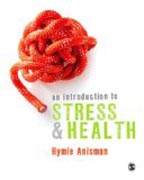
An Introduction to Stress and Health is the first textbook of its kind to fuse the psychosocial with newer behavioural neuroscience perspectives. Very uniquely, it provides a broad perspective of the multiple biological processes influenced by stressful events, the conditions that allow for either exacerbation or diminution of these stressor effects, and the pathological conditions that can emerge as a result of stressful events. The author systematically reviews the key research over the past 30 years, including the most up-to-date studies, and presents his insights in a lively, interesting pedagogical fashion to allow you to fully appreciate the diversity of the field of stress and its impact on our health. Key features include: A consideration of the value of numerous therapeutic strategies to diminish distress and stress-related pathologies. An exploration of many new conceptual perspectives relevant to stress processes and pathology. Information is presented in an easy-to-read manner with lots of pointers to the key concepts to remember, and many devices in place to reinforce your understanding of these. An Introduction to Stress and Health is an indispensable text for upper-level undergraduate and postgraduate students taking courses in health psychology, stress, health and illness, or any other courses focusing on stress and health issues. INDICE: Chapter 1 THE NATURE OF STRESSORS Some basic definitions and concepts Characterizing stressors Measuring stressors Individual differences: Vulnerability and resilience Concluding commentsChapter 2. APPRAISALS, COPING AND WELL-BEING Appraisals and Coping skills Emotional responses Coping with stressors Social support Concluding CommentsChapter 3. HORMONAL CHANGES ASSOCIATED WITH STRESSORS Hormones and behavior Assessing the relation between hormones and behaviors Biological stress responses The hypothalamic pituitary adrenal (HPA) axis and glucocorticoids Corticotropin releasing hormone (CRH) Stress, energy balances and eating to cope Prolactin Estrogen and Testosterone Oxytocin Concluding commentsChapter 4. NEUROTRANSMITTER PROCESSES PROMOTED BY STRESSORS Neuronal and glial processes in relation to challenges Neurotransmitter changes elicited by stressors Biogenic amine: norepinephrine, dopamine and serotonin Acetylcholine (ACh) ?-Aminobutyric acid (GABA) Glutamate Cannabinoids Growth factors Sensitized neuronal responses Concluding commentsChapter 5. IMMUNOLOGICAL EFFECTS OF STRESSORS What the immune system is supposed to do The immune system (a very brief primer) Immune-hormone interactions Stress, central processes and immunological alterations: Animal studies Stressor effects on immune functioning in humans Stressors and cytokine changes Sensitization Concluding CommentsChapter 6. STRESS IMMUNITY AND DISEASE Immunity and Disease Infectious Illness Autoimmune disorders Cancer Diabetes Concluding comments Chapter 7. CARDIOVASCULAR DISEASE Diseases of the heart The heart’s typical response to a stressor Psychosocial factors associated with heart disease Personality factors in relation to heart disease Physiological stress responses that affect heart disease Diabetes Concluding remarksChapter 8. DEPRESSIVE DISORDERS What is depression? Theoretical Constructs related to Depressive Illness: Cognitive perspectives Neurochemical perspectives on stressor-provoked behavioral disturbances Neurochemical explanations of depressive disorder Growth Factors in Depression Depression – What’s it good for anyways Concluding CommentsChapter 9. ANXIETY DISORDERS Subtypes of anxiety Generalized anxiety disorder (GAD) Panic Disorder Phobias Obsessive-compulsive disorder Posttraumatic stress disorder (PTSD) Concluding commentsChapter 10. ADDICTION Stress in relation to the addiction process Reward and aversion in relation to addiction Dopamine and reward processes Corticotropin hormone in relation to stress and addiction A different perspective on addiction: eating related peptides An integrated perspective Treatment for Addictions Concluding commentsChapter 11: TRANSMISSION OF TRAUMA ACROSS GENERATIONS A voyage across generations Intergenerational effects of trauma Impact of trauma on later responses to challenges Impact of prenatal insults Epigenetic Changes Collective and historic trauma Concluding commentsChapter 12. STRESS BUSTING: TREATMENT STRATEGIES Relaxation training Cognitive behavioral therapy (CBT) Meditation Mindfulness The Third Wave of Behavioral Therapies Pharmacotherapy Antidepressant Agents Antianxiety agents Herbal (naturopathic) treatments Concluding remarksChapter 13. NAVIGATING STIGMA AND SEEKING HEALTH Discrimination and stigmatization Stigma related to mental illness Responses to stressors and social support Trust in the health system. Turning to the internet. Concluding remarks
- ISBN: 978-1-4462-7075-2
- Editorial: SAGE Publications Ltd
- Encuadernacion: Rústica
- Páginas: 488
- Fecha Publicación: 06/01/2014
- Nº Volúmenes: 1
- Idioma:
